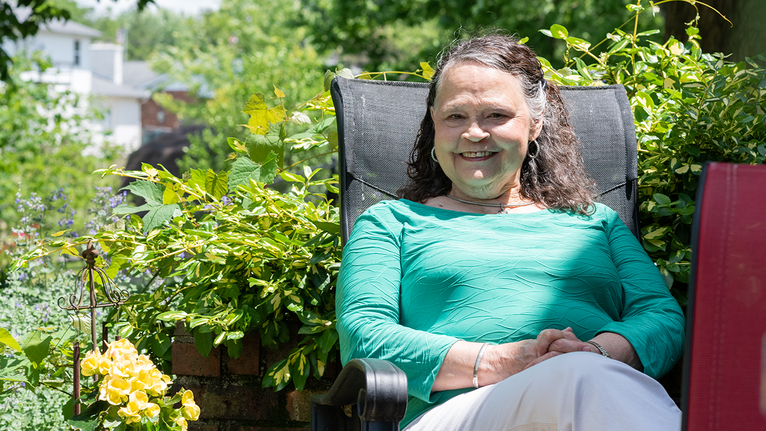As the summer turned into fall, she called her doctors to move up a colonoscopy that she had originally scheduled for late December.
On Nov. 18, 2017, she was diagnosed with stage III distal rectal cancer, and her primary care physician referred her to Jonathan Snyder, MD, UC Health colorectal surgeon at the University of Cincinnati Cancer Center and associate professor of oncology at the UC College of Medicine, and Jordan Kharofa, MD, UC Health radiation oncologist at the University of Cincinnati Cancer Center and associate professor of radiation oncology at UC College of Medicine.
“I could sense something was wrong,” she says. “Hearing that it was stage III was the most terrifying part.”
Like Dovie, patients across the U.S. and the world are diagnosed with gastrointestinal cancers every year. Treatment is more effective when the cancer is detected at an early stage.
Gastrointestinal cancer includes all cancers in your digestive tract organs such as the stomach, large and small intestine, pancreas, colon, liver, rectum, anus and biliary system. GI cancers account for 26% of the global cancer incidence and 35% of all cancer-related deaths, according to a study from the National Institutes of Health.
Dovie told Dr. Snyder and Dr. Kharofa that she wanted to live to see her granddaughter, Courtney, graduate from high school in May 2018, and she began months of a rigorous course of radiation and chemotherapy treatment. The doctors also told her that she would likely need surgery after the treatment to remove any remaining cancer.
When she finished her radiation and chemotherapy, the tumor was gone.
“Her therapy was given with the understanding that she would most likely have surgery. Due to the location of her tumor, surgery would have involved the complete removal of her rectum and anus and the creation of a permanent colostomy. When someone has a colostomy, a portion of their large intestine is surgically delivered through their belly and sutured to the skin, such that all of their fecal waste empties into a bag. Some colostomies are temporary and reversible—this one would not have been,” says Dr. Snyder. “Ultimately, what happened in her case was that she had an apparent ‘complete clinical response,’ which is the absence of evidence of her rectal tumor after treatment.”
The Benefit of “Watch-and-Wait” for Rectal Cancer and Other GI Cancers
Dovie’s case represents a relatively new approach for treating some types of gastrointestinal cancers. Coined as the watch and wait, the non-operative (no surgery) approach has been used more often in select patients. The watch-and-wait strategy offers a non-invasive therapeutic alternative for rectal cancer patients who have achieved a complete clinical response after chemoradiotherapy.
What is the “Watch and Wait” Cancer Treatment Protocol?
Dr. Kharofa says this approach has gathered momentum based on data and evidence from around the world that shows its success. “We're looking at ways to improve the odds of having a complete response. What we now know is that if you give the radiation therapy first, then the full dose of chemotherapy, prior to surgery or prior to assessment, you can enhance outcomes even further, or the number of patients who have a complete response (absence of the tumor) and who can avoid surgery altogether,” he says.
For some patients, this approach allows them to avoid surgery and challenging lifestyle changes, like coping with a permanent colostomy. Now five years later, Dovie has not experienced any recurrence of her cancer and she has watched her granddaughter graduate from high school and college. She has continued to watch her adult children thrive and her grandchildren grow into young adults, while staying active with her hobbies, including reading and gardening.
“It is a miracle from God. I could be gone,” Dovie says. “Because of medical science and the care I received at the University of Cincinnati Cancer Center, I have had these years to live and be with my family.”
Tips for Early Prevention and Detection GI Cancers
While new treatment approaches are positive news for patients, both Dr. Kharofa and Dr. Snyder say the early detection and prevention of GI cancers can help people avoid treatment altogether. Tips for early prevention and detection include:
- Following the recommendations to begin screening colonoscopies at the age of 45, unless you have gastrointestinal symptoms that would otherwise potentially require earlier investigations.
- Being aware of any genetic precursors that could impact your chances of developing a type of gastrointestinal cancer.
- Speaking to your healthcare provider about any changes to your bowel movements, including blood in your stool. Note any symptoms including nausea, vomiting, change in appetite, swelling of the abdomen, heartburn or indigestion.
- Making positive lifestyle choices such as maintaining a healthy weight, limiting alcoholic drinks and never using tobacco products.
Discover More
To receive the name of a colorectal cancer specialist at the UC Health West Chester Campus, please call 513-298-DOCS (3627). To learn more about the University of Cincinnati Cancer Center call 513-585-UCCC.
